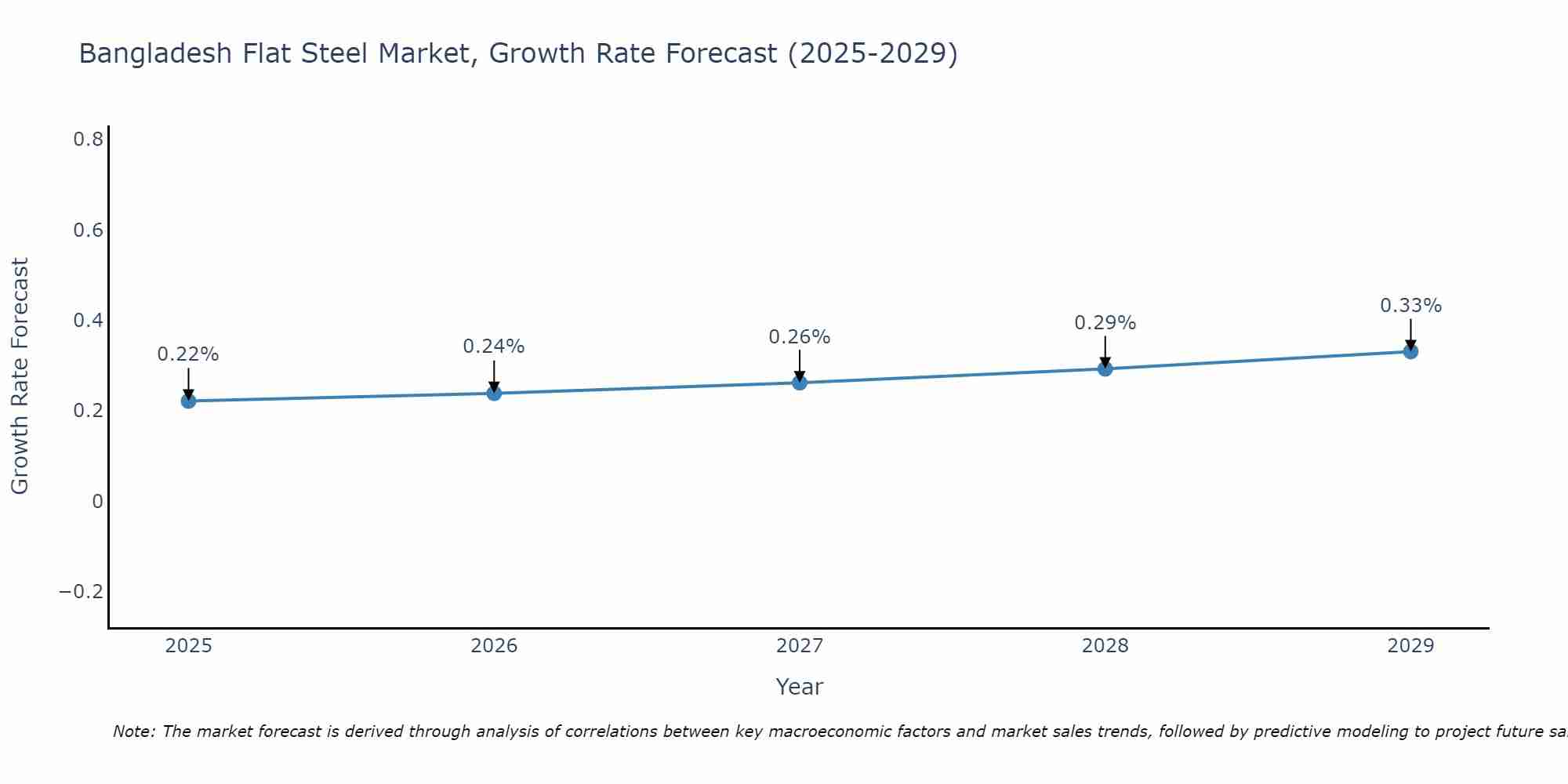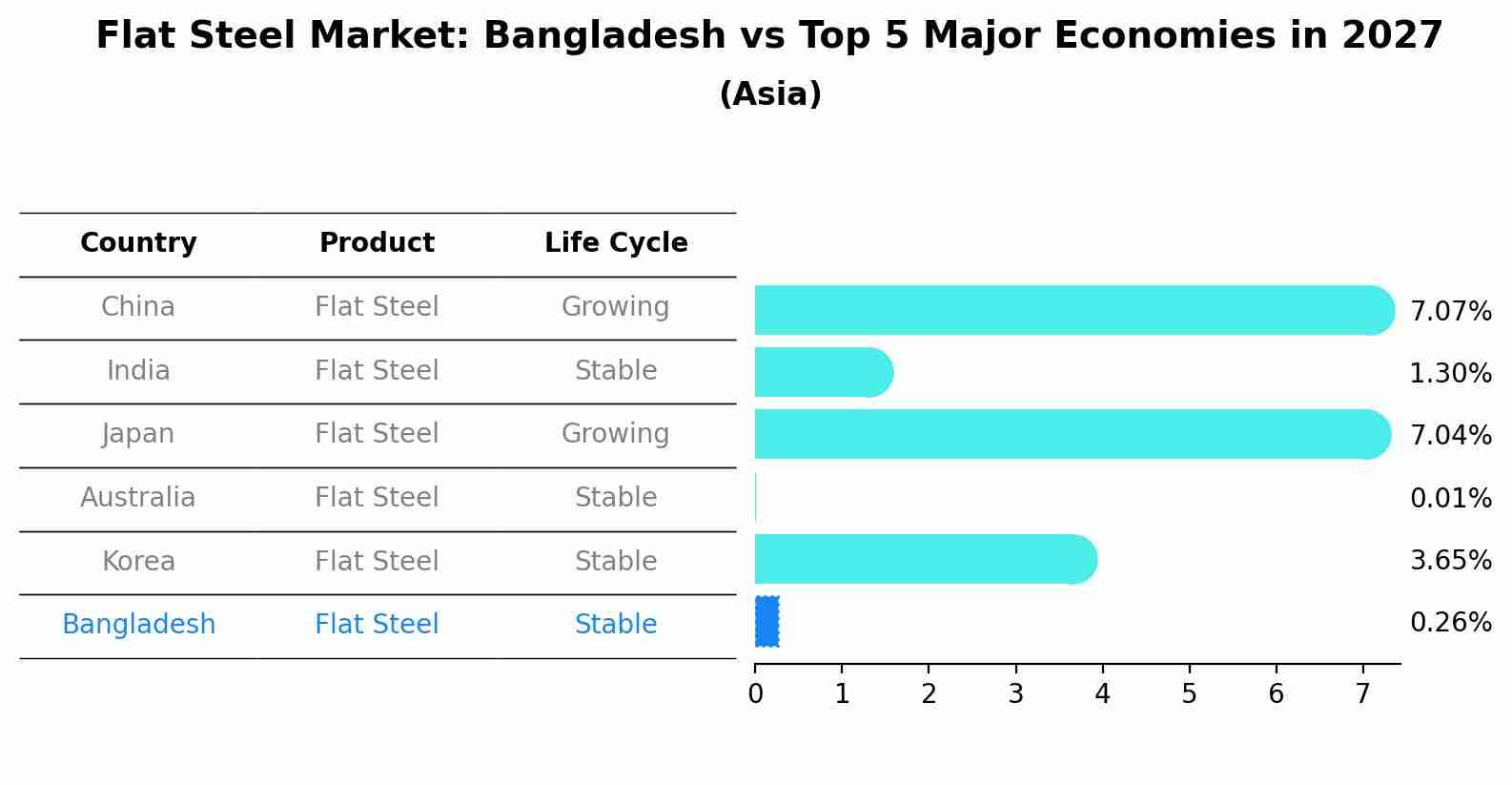Bangladesh Flat Steel Market (2025-2031) Outlook | Growth, Value, Forecast, Industry, Trends, Share, Revenue, Size, Analysis & Companies
| Product Code: ETC356732 | Publication Date: Aug 2022 | Updated Date: Aug 2025 | Product Type: Market Research Report | |
| Publisher: 6Wresearch | Author: Summon Dutta | No. of Pages: 75 | No. of Figures: 35 | No. of Tables: 20 |
Bangladesh Flat Steel Market Size Growth Rate
The Bangladesh Flat Steel Market is likely to experience consistent growth rate gains over the period 2025 to 2029. The growth rate starts at 0.22% in 2025 and reaches 0.33% by 2029.

Flat Steel Market: Bangladesh vs Top 5 Major Economies in 2027 (Asia)
By 2027, the Flat Steel market in Bangladesh is anticipated to reach a growth rate of 0.26%, as part of an increasingly competitive Asia region, where China remains at the forefront, supported by India, Japan, Australia and South Korea, driving innovations and market adoption across sectors.

Bangladesh Flat Steel Market Synopsis
The Bangladesh flat steel market is experiencing steady growth due to the country`s expanding construction and infrastructure sectors. With increasing urbanization and industrialization driving demand for flat steel products like sheets, coils, and plates, local producers are ramping up production to meet the market needs. The government`s focus on infrastructure development projects, such as roads, bridges, and buildings, further fuels the demand for flat steel in Bangladesh. Additionally, the automotive and manufacturing industries are significant consumers of flat steel, contributing to the overall market growth. Key players in the Bangladesh flat steel market include local manufacturers like BSRM, KSRM, and Abul Khair Steel, as well as imports from countries like China, India, and Japan. Overall, the future outlook for the Bangladesh flat steel market remains positive, driven by ongoing infrastructure projects and industrial expansion.
Bangladesh Flat Steel Market Trends
Currently, the Bangladesh flat steel market is experiencing several key trends. Firstly, there is a growing demand for high-quality flat steel products in construction and infrastructure projects due to urbanization and industrialization in the country. Secondly, there is an increasing focus on sustainability and environmentally friendly production processes, leading to a rise in the adoption of green steel practices. Additionally, technological advancements in manufacturing processes and the use of automation are improving efficiency and reducing production costs for flat steel manufacturers in Bangladesh. Lastly, the government`s initiatives to promote local production and reduce dependency on imports are driving investments in the domestic flat steel industry, leading to further growth and development in the market.
Bangladesh Flat Steel Market Challenges
In the Bangladesh Flat Steel Market, several challenges are faced, including fluctuating raw material prices, intense competition from imported steel products, inadequate infrastructure for transportation and logistics, and inconsistent government policies. The country heavily relies on imported raw materials for steel production, making the industry vulnerable to global price fluctuations. Local manufacturers also struggle to compete with cheaper imported steel products, impacting their market share and profitability. Additionally, the inadequate transportation and logistics infrastructure in Bangladesh hinders the efficient movement of flat steel products, leading to delays and increased costs. Moreover, the industry faces uncertainty due to inconsistent government policies related to tariffs, taxes, and regulations, creating a challenging business environment for stakeholders in the flat steel market. Addressing these challenges will be crucial for the sustainable growth and competitiveness of the sector.
Bangladesh Flat Steel Market Investment Opportunities
The Bangladesh flat steel market offers promising investment opportunities due to the country`s rapid urbanization, infrastructure development, and growing industrial sector. With increasing construction projects, demand for flat steel products such as hot-rolled coils, cold-rolled coils, and galvanized sheets is on the rise. Investing in flat steel manufacturing facilities or trading businesses can be lucrative as Bangladesh continues to upgrade its infrastructure and expand industries such as automotive, shipbuilding, and appliances. Additionally, the government`s focus on economic growth and attracting foreign investment further enhances the market potential. Partnerships with local steel manufacturers or distributors can provide access to a rapidly growing market with strong long-term prospects for investors in the flat steel sector in Bangladesh.
Jordan Agar Market Government Policies
The Bangladesh government has implemented several policies to support the flat steel market, including imposing anti-dumping duties on imported flat steel products to protect domestic manufacturers and promote self-sufficiency. Additionally, the government has provided incentives such as tax breaks and subsidies to encourage investments in the sector and boost production capacity. To ensure quality standards and fair competition, regulatory bodies like the Bangladesh Standards and Testing Institution (BSTI) monitor and enforce compliance with industry regulations. The government also focuses on infrastructure development to support the growth of the flat steel market, particularly in the construction and automotive sectors, driving demand for flat steel products in the country.
Bangladesh Flat Steel Market Future Outlook
The future outlook for the Bangladesh Flat Steel Market appears promising, driven by factors such as rapid urbanization, industrialization, and infrastructural development in the country. The construction sector, automotive industry, and manufacturing activities are expected to fuel the demand for flat steel products. Additionally, initiatives to boost foreign investments and improve trade relations are likely to further stimulate market growth. The government`s focus on enhancing the transportation network, energy infrastructure, and overall economic development will create opportunities for flat steel manufacturers and suppliers in Bangladesh. However, challenges such as fluctuating raw material prices, global economic uncertainties, and environmental regulations may impact the market dynamics. Overall, the Bangladesh Flat Steel Market is poised for expansion in the coming years, supported by favorable industry trends and government initiatives.
Key Highlights of the Report:
- Bangladesh Flat Steel Market Outlook
- Market Size of Bangladesh Flat Steel Market, 2024
- Forecast of Bangladesh Flat Steel Market, 2031
- Historical Data and Forecast of Bangladesh Flat Steel Revenues & Volume for the Period 2021 - 2031
- Bangladesh Flat Steel Market Trend Evolution
- Bangladesh Flat Steel Market Drivers and Challenges
- Bangladesh Flat Steel Price Trends
- Bangladesh Flat Steel Porter's Five Forces
- Bangladesh Flat Steel Industry Life Cycle
- Historical Data and Forecast of Bangladesh Flat Steel Market Revenues & Volume By process for the Period 2021 - 2031
- Historical Data and Forecast of Bangladesh Flat Steel Market Revenues & Volume By Basic Oxygen Furnace for the Period 2021 - 2031
- Historical Data and Forecast of Bangladesh Flat Steel Market Revenues & Volume By Electric Arc Furnace for the Period 2021 - 2031
- Historical Data and Forecast of Bangladesh Flat Steel Market Revenues & Volume By type for the Period 2021 - 2031
- Historical Data and Forecast of Bangladesh Flat Steel Market Revenues & Volume By Sheets & Strips for the Period 2021 - 2031
- Historical Data and Forecast of Bangladesh Flat Steel Market Revenues & Volume By Plates for the Period 2021 - 2031
- Historical Data and Forecast of Bangladesh Flat Steel Market Revenues & Volume By end-use sector for the Period 2021 - 2031
- Historical Data and Forecast of Bangladesh Flat Steel Market Revenues & Volume By Building & Infrastructure for the Period 2021 - 2031
- Historical Data and Forecast of Bangladesh Flat Steel Market Revenues & Volume By Mechanical Equipment for the Period 2021 - 2031
- Historical Data and Forecast of Bangladesh Flat Steel Market Revenues & Volume By Automotive & Other Transport for the Period 2021 - 2031
- Historical Data and Forecast of Bangladesh Flat Steel Market Revenues & Volume By Others for the Period 2021 - 2031
- Bangladesh Flat Steel Import Export Trade Statistics
- Market Opportunity Assessment By process
- Market Opportunity Assessment By type
- Market Opportunity Assessment By end-use sector
- Bangladesh Flat Steel Top Companies Market Share
- Bangladesh Flat Steel Competitive Benchmarking By Technical and Operational Parameters
- Bangladesh Flat Steel Company Profiles
- Bangladesh Flat Steel Key Strategic Recommendations
Frequently Asked Questions About the Market Study (FAQs):
- Single User License$ 1,995
- Department License$ 2,400
- Site License$ 3,120
- Global License$ 3,795
Search
Related Reports
- Australia IT Asset Disposal Market (2025-2031) | Strategy, Consumer Insights, Analysis, Investment Trends, Opportunities, Growth, Size, Share, Industry, Revenue, Segments, Value, Segmentation, Supply, Forecast, Restraints, Outlook, Competition, Drivers, Trends, Demand, Pricing Analysis, Competitive, Strategic Insights, Companies, Challenges
- UAE Building Thermal Insulation Market Outlook (2025-2031) | Revenue, Companies, Share, Trends, Growth, Size, Forecast, Industry, Analysis & Value
- Portugal Electronic Document Management Market (2025-2031) | Strategy, Consumer Insights, Analysis, Investment Trends, Opportunities, Growth, Size, Share, Industry, Revenue, Segments, Value, Segmentation, Supply, Forecast, Restraints, Outlook, Competition, Drivers, Trends, Demand, Pricing Analysis, Competitive, Strategic Insights, Companies, Challenges
- France Electronic Document Management Market (2025-2031) | Strategy, Consumer Insights, Analysis, Investment Trends, Opportunities, Growth, Size, Share, Industry, Revenue, Segments, Value, Segmentation, Supply, Forecast, Restraints, Outlook, Competition, Drivers, Trends, Demand, Pricing Analysis, Competitive, Strategic Insights, Companies, Challenges
- Portugal Occupational Health & Safety Services Market (2025-2031) | Strategy, Consumer Insights, Analysis, Investment Trends, Opportunities, Growth, Size, Share, Industry, Revenue, Segments, Value, Segmentation, Supply, Forecast, Restraints, Outlook, Competition, Drivers, Trends, Demand, Pricing Analysis, Competitive, Strategic Insights, Companies, Challenges
- Netherlands Occupational Health and Safety Services Market (2025-2031) | Strategy, Consumer Insights, Analysis, Investment Trends, Opportunities, Growth, Size, Share, Industry, Revenue, Segments, Value, Segmentation, Supply, Forecast, Restraints, Outlook, Competition, Drivers, Trends, Demand, Pricing Analysis, Competitive, Strategic Insights, Companies, Challenges
- Belgium and Luxembourg Facility Management Market (2025-2031) | Strategy, Consumer Insights, Analysis, Investment Trends, Opportunities, Growth, Size, Share, Industry, Revenue, Segments, Value, Segmentation, Supply, Forecast, Restraints, Outlook, Competition, Drivers, Trends, Demand, Pricing Analysis, Competitive, Strategic Insights, Companies, Challenges
- Russia Women Intimate Apparel Market (2025-2031) | Strategy, Consumer Insights, Analysis, Investment Trends, Opportunities, Growth, Size, Share, Industry, Revenue, Segments, Value, Segmentation, Supply, Forecast, Restraints, Outlook, Competition, Drivers, Trends, Demand, Pricing Analysis, Competitive, Strategic Insights, Companies, Challenges
- Africa Chocolate Market (2025-2031) | Size, Share, Trends, Growth, Revenue, Analysis, Forecast, industry & Outlook
- Global Hydroxychloroquine And Chloroquine Market (2025-2031) | Industry, Trends, Size, Outlook, Growth, Value, Companies, Revenue, Analysis, Share, Forecast
Industry Events and Analyst Meet
Our Clients
Whitepaper
- Middle East & Africa Commercial Security Market Click here to view more.
- Middle East & Africa Fire Safety Systems & Equipment Market Click here to view more.
- GCC Drone Market Click here to view more.
- Middle East Lighting Fixture Market Click here to view more.
- GCC Physical & Perimeter Security Market Click here to view more.
6WResearch In News
- Doha a strategic location for EV manufacturing hub: IPA Qatar
- Demand for luxury TVs surging in the GCC, says Samsung
- Empowering Growth: The Thriving Journey of Bangladesh’s Cable Industry
- Demand for luxury TVs surging in the GCC, says Samsung
- Video call with a traditional healer? Once unthinkable, it’s now common in South Africa
- Intelligent Buildings To Smooth GCC’s Path To Net Zero













